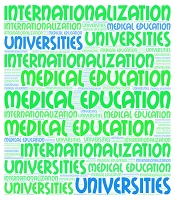Dear Editor,
In today’s world, there is an increasing need for medical professionals to engage with and understand health and wellness perspectives across different countries and cultures (1). To foster such collaboration within the medical community, it is essential to implement comprehensive programs in medical science universities worldwide. The internationalization of medical education (IoME) prepares healthcare professionals for transformative work that transcends national borders. This need has become even more pronounced in the wake of the COVID-19 pandemic. Internationalization of medical education enables medical students to develop the knowledge and understanding necessary for their roles within a global healthcare community, allowing them to practice medicine in their own countries with a broader perspective. As a result, medical communities can better appreciate the benefits and implications of international interactions and workforce exchanges. They can also train globally-minded healthcare providers capable of working with diverse patient populations and colleagues (2).
The internationalization of medical universities is crucial for equipping specialists with the global skills and mindsets necessary for transformative actions on an international scale. By preparing graduates to work in diverse cultural settings, IoME fosters a cohesive global medical community that can collaboratively address health crises through the use of social media and advanced technology. This shared community promotes knowledge exchange, effective communication, and a sense of belonging within the global medical field (3). Moreover, IoME provides a platform for information exchange, enhances communication, and builds a foundation for fostering collaboration among future healthcare providers. It also broadens students' awareness of the social, cultural, economic, and ethical differences that influence healthcare worldwide. By enhancing their familiarity with cultural competencies and the importance of these differences in patient care, IoME creates the infrastructure necessary for the internationalization of patient care (4).
However, a primary challenge with IoME lies in the lack of standardized guidelines and consistent definitions (2). This issue prevents universities participating in the program from scheduling precise curricula, resulting in some institutions being unable to issue certificates for specific fields. Beyond the curricula, universities also need to educate students on professional qualifications (5). The absence of adequate cultural preparation can hinder some students from performing effectively in diverse settings. Additionally, economic and physical limitations faced by certain students may create barriers to participation, making IoME seem like an inequitable and overly demanding program. Furthermore, the phenomenon of "brain drain," where students who study abroad choose not to return to their home country, has become a controversial issue. This can lead to an imbalance in the global healthcare workforce, further complicating the implementation of IoME (2).
One solution to these challenges is the internationalization of the curriculum (IoC), which involves evaluating content, pedagogical approaches, learning outcomes, and the support provided at both structured and institutional levels. Implementing IoC requires a holistic approach that includes collaboration among academic departments, faculty development programs, and student feedback mechanisms to ensure that the curriculum is globally relevant while locally applicable. If medical universities aim for their graduates to develop a global perspective and intercultural competence to serve patients more professionally, they should incorporate IoC into core courses and skills development throughout the semesters. Internationalization of the curriculum provides a valuable opportunity for international collaboration among universities, enabling the exchange of best practices, joint research initiatives, and the development of universally recognized competencies in medical education.
Additionally, the admission of international students is often determined by visa status or tuition fees rather than their cultural or economic backgrounds. This approach frequently overlooks the diverse needs of international students, leading to challenges in adapting to new educational environments and limiting their overall success. To address these issues, universities could implement filters to select qualified students and establish regulations that promote equity among applicants from low-, middle-, and high-income countries (6).
In conclusion, it is essential to focus on the internationalization of medical universities to enhance cultural competence. With this advancement, healthcare providers will be better equipped to communicate across cultures, fostering the concept of "borderless medicine" worldwide. We hope this letter underscores the critical advantages and disadvantages of the internationalization of medical education and highlights practical actions to improve its framework.
